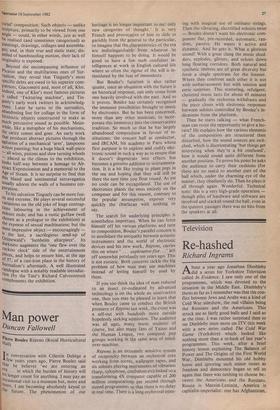Man power
Duncan Fallowell
In conversation with Celestin Deliege a few years years ago, Pierre Boulez said that he believes 'we are entering an era .. in which the burden of history will no longer count for anything. I may pay an occasional visit to a museum but, more and ,, more, I am becoming absolutely keyed to the future. The phenomenon of our
heritage is no longer important to me: only new categories of thought.' It is very French and provocative of him to slide so garishly from the general to the particular, to imagine that the characteristics of the era are indistinguishable from whatever he himself happens to be doing. It would be good to have a few such confident in- telligences at work in English cultural life where so often the vigour of the will is in- timidated by the fear of immodesty.
But Boulez's futurism is also rather quaint, since an obsession with the future is an historical response, can only come from one heavily involved with the past. And so it proves. Boulez has certainly recognised the immense possibilities brought to music by electronics. But he has been concerned, more than any other musician, to incor- porate this immensity into the conservatoire tradition. So much so that he has largely abandoned composition in favour of in- stitutions: the concert hall as conductor, and IRCAM, his academy in Paris whose first purpose is to explore and codify elec- tronic sound in such a way as to ensure that it doesn't degenerate into effects but becomes a genuine addition to instrumenta- tion. It is a bit like trying to plant pegs in the sea and hoping that they will still be there the next time you float round. As yet no code can be extrapolated. The use of electronics places the onus entirely on the composer and for this reason, contrary to the popular assumption, exposes very quickly the charlatan with nothing to say.
The search for underlying principles is nonetheless important. When he can force himself off his various platforms and turn to composition, Boulez's parallel concern is to annihilate the antipathy between acoustic instruments and the world of electronic devices and his new work, Repons, carries this on where ... explosante-fixe...' left off somewhat petulantly ten years ago. This is not esoteric. Both concerns tackle the big problem of how man may use machines instead of letting himself by used by them.
If you too think the idea of man reduced to an insect co-ordinated by advanced technology is on the whole an unattractive one, then you may be pleased to learn that when Boulez came to conduct the British premiere of Repons last week, the event was a sell-out with hundreds more outside hopelessly seeking admission. The audience was all ages, many music students of course, but also many fans of Yazoo and the Human League, two computer pop groups working in the same area of mind- over-machine.
Repons is an extremely sensitive system of reciprocity between an orchestral core working from scores, wallpaper tapes, and six soloists playing instruments of vibration (harp, xylophone, cimbalom etc) linked to a transforming 4X computer capable of 200 million computations per second through stored programmes so that there is no delay in real time. There is a long orchestral open- ing with magical use of ostinato strings. Then the vibrating, electrified soloists enter
— Boulez doesn't want his electronic com- ponent flat, pre-recorded, automatic, ran- dom, passive. He wants it active and dynamic. And he gets it. What a glorious sound! With a great clang the music shud- ders, explodes, glitters, and echoes down long floating corridors. Both natural and synthetic timbres are of great diversity but form a single spectrum for the listener. Where they confront each other it is not with embarrassment but with tension and eerie surprises. This stuttering, refulgent, clustered music lasts for about 45 minutes — gradually the orchestra withdraws and the piece closes with electronic responses between soloists controlled by Boulez's in- dications from the platform.
Then he starts talking — what French- man can resist the opportunity to give a lec- ture? He explains how the various elements of the composition are structured then disturbed, how the sound sources are swit- ched, which is disorientating 'but things get interesting when they're a bit confused', how it would sound quite different from another position. To prove his point he asks the audience to carry their cushions (for there are no seats) to another part of the hall which, tinder the charming eye of the master, they obediently do. Then he plays it all through again. Wonderful. Technical note: this is a very high-grade operation though piles of hardware and software are involved and stacked round the hall, even in the quietest passages there was no hiss from the speakers at all.


































 Previous page
Previous page